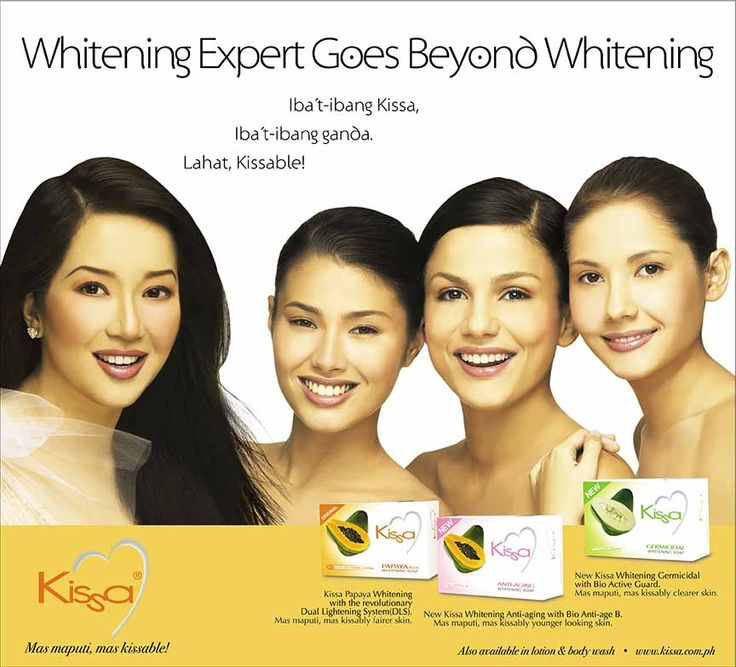
Original ad retrieved from: https://i.pinimg.com/736x/e9/a2/e5/e9a2e5a51678b8d940d5bdd1c5ce3f38.jpg

Original ad retrieved from: https://i.pinimg.com/736x/e9/a2/e5/e9a2e5a51678b8d940d5bdd1c5ce3f38.jpg
The original ad is promoting “Kissa,” a whitening soap brand in the Philippines. This brand is just one among many other whitening products that fill the shelves of Filipino stores. The bottom text of the ad translates to, “Whiter, more kissable!” and underneath the three different kinds of soap the texts say, “Whiter, kissably fairer skin,” “Whiter, kissably younger skin,” and “Whiter, kissably clearer skin.” If the soaps weren’t enough, the ad also reminds the viewer that the brand is also available as a lotion or body wash. The ad is problematic because it reflects centuries of influence by white colonizers that exists even today. The Philippines has a long colonial history, first having been occupied by the Spanish for more than 300 years from 1521 to 1898, then immediately afterwards by the Americans, only gaining independence after World War II.
The effects of colonization, however, still permeate throughout Filipino society. Growing up in the Philippines, I was keenly aware of the term “colonial mentality,” which refers to primarily a Western way of life or American products being perceived as better by Filipinos. In this way, the culture of preferring to have fair skin has become inextricably part of the standard of beauty in the Philippines. To be white is to be seen as prettier, wealthier, and smarter. Having dark skin is associated with being poor, uneducated, and ugly. This kind of thinking is destructive and only serves to widen the divide between fellow Filipinos while holding up the white colonizers on a shining pedestal. Besides encouraging white skin, the ad also detrimentally promotes the preoccupation with women’s looks, putting emphasis on the need for women to be “kissable” and “younger.”
Works Cited
http://www.philippinecountry.com/philippine_history/spanish_colonization.html

My jammed version of the ad aims to explicitly reveal the colonial mentality that influences not just Filipinos, but people of color around the world. Filipinos are not the only group told to strive for whiteness in order to gain status. Marira & Mitra (2013) define the term colorism as using skin tone to discriminate outside or within one’s ethnic group. They point to copious amounts of research that show preference for lighter skin among White, Latino, and Asian populations (Marira & Mitra, 2013, p. 104). The tagline I placed under the ad’s headline is for highlighting how people of color are too often made to feel ashamed of their skin, at which point they come to believe that imitating the look of white skin is what will help them feel better about themselves.
I also make a point of including the world “colonizers” in the tagline to stress the continued harmful effects on societies once dominated by colonial powers around the world. Colonialism has never really disappeared. It continues to exist, albeit perhaps in more subtle ways. I replaced the bottom texts with the lines, “Love the skin you’re in…but only if you’re white” and “WHITE” “WHITEN” “WHITEN EVEN MORE” to point out the ridiculousness in how people of color are relentlessly put down for their natural skin color, bombarded by multiple ways (represented by the three kinds of soap that are practically the same thing) to become whiter. Through the culture jamming of this skin lightening ad, it calls for the denunciation of associating dark skin with negative traits. In contrast, it also calls into examination the roots of how white skin has come to be perceived as the shining ideal of beauty, going back to the historical effects of colonialism.
Works Cited
Marira, T. D. and Mitra, P. (2013). Colorism: Ubiquitous Yet Understudied. Ind Organ Psychol, 6, 103–107. doi:10.1111/iops.12018